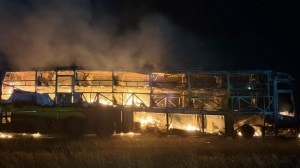Unlike their Saudi counterparts, Iraqi women take driver’s seat
The black-masked militias have vanished from most Baghdad streets, and the car bombings are down to one or two a day.

The black-masked militias have vanished from most Baghdad streets, and the car bombings are down to one or two a day. So one recent afternoon, Hadeel Ahmed, a ponytailed college student in jeans, did something few Iraqi women have dared in recent years.
She drove a car.
“It bothers me to have to depend on my brother or father to take me everywhere,” the 25-year-old student declared, after finishing a class at al-Riyadh Driving School. “I want to be independent.”
Since the 2003 US-led invasion, women in the Iraqi capital have virtually disappeared from behind the wheel. With gun battles raging, the police force collapsing and the traffic lights dead, highways turned into a Mad Max world. Even today, you can travel for a half-hour across the sprawling city and not see a single woman driving.
But with the sharp drop in violence this year, women are venturing onto the roads. They are reclaiming freedoms denied by the Islamic extremists who warned them to stop driving, give up makeup and cover their hair.
Ahmed is one of those who has taken advantage of the waning presence of the militias to abandon her head scarf and long skirts and get behind the wheel. “Driving means someone is brave,” she said. “They’re strong. Not only in body, but also in spirit.”
While there are few statistics to document the rise in women on the road — driver’s licenses haven’t been issued since the 2003 invasion — it is evident at schools like al-Riyadh. Manager Sabah Kadhim said 29 of his 50 students are women, a 70 per cent increase compared with recent years. The Iraqi Automobile and Tourism Association reported that 123 people signed up for driving lessons in November, most of them women.
“Women used to be everywhere driving their cars. Then we saw a backslide,” said Safia al-Souheil, an MP and women’s rights activist. “Today is much better.”
Unlike in Saudi Arabia, women in Iraq face no legal barriers to driving. For decades, Iraq was one of the most secular countries in West Asia, with women going to college, competing in sports and enjoying legal protections in marriage, divorce and inheritance.
But as the country slid into chaos and kidnappers began prowling the streets. Islamic extremists threw acid in the faces of women who went out unveiled.
“Even if we had learned to drive, it wouldn’t have mattered. You would have had to stay at home,” said Sabah Salman, 24, a college student in an exuberant yellow head scarf, green polka-dot jacket and long black skirt, sitting next to Ahmed, her cousin, in al-Riyadh’s reception area.
Women weren’t the only ones affected by the violence. But, in this patriarchal society, they were seen as more vulnerable, especially since many men started carrying weapons. To get around, women had to resort to taxis, buses or rides from husbands.
Salman said she longs to “jump in the car” and go shopping or visit friends. But driving is about more than convenience, she said.
“The country is developed now. It’s a period of fast change,” she said. Since the fall of Saddam Hussein, she noted, Iraq has ceased to be cut off from the world. Its citizens have acquired satellite TV, cellphones, computers.



- 01
- 02
- 03
- 04
- 05



























